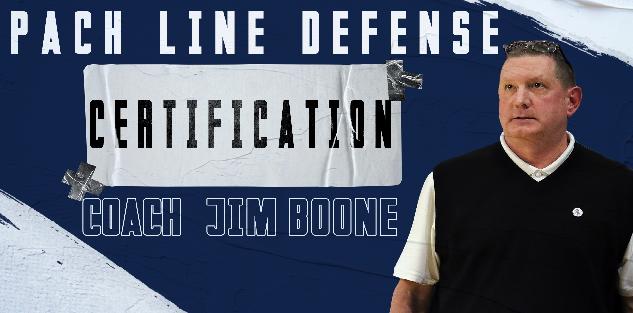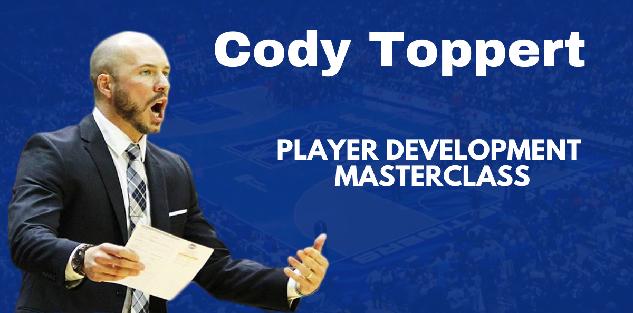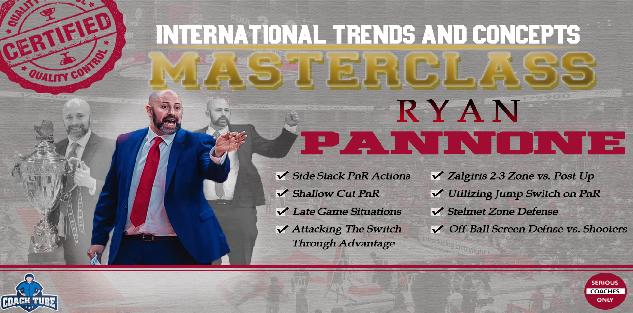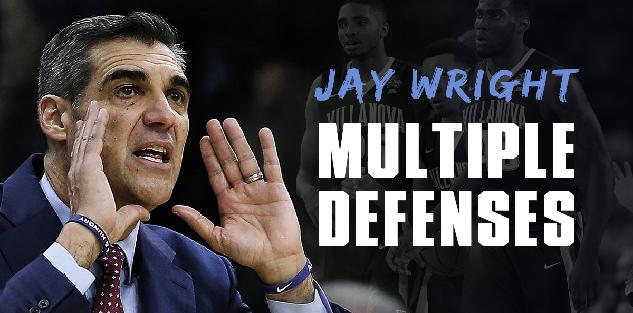Featured courses
- Two Great Game Situational Workouts For the Basketball Offseason by Grant Young
- Two Reads Basketball Players Must Understand Before Executing the Ball-Screen by Grant Young
- Two of LSU Coach Kim Mulkey’s Game-Winning Inbounds Plays by Grant Young
- Three Effective Early-Season Defensive Basketball Drills by Grant Young
- Four Essential Tips For Basketball’s 1-3-1 Zone Defense by Grant Young
- Four Zone Defense Drills to Strengthen Your Team by Grant Young
- How to Beat the Three Most Common Pick and Roll Coverages by Grant Young
- Two Drills to Improve Shooting at the Start of the Basketball Season by Grant Young
- Core Basketball Principles That Dallas Mavericks Coach Sean Sweeney Teaches by Grant Young
- Three Competitive Shooting Drills For Your Basketball Team by Grant Young
- How To Teach The ‘I’ Generation of Basketball Players by Grant Young
- Three Elite Drills to Begin a Basketball Practice With by Grant Young
- How to Build a Championship-Winning Basketball Team Culture by Grant Young
- Two of Texas Women’s Basketball Coach Vic Schaefer’s Tips For Team Culture by Grant Young
- Atlanta Dream WNBA Coach Brandi Poole’s Four Sets for Secondary Offense by Grant Young
- NC State Basketball Coach Brett Nelson’s 4 Crucial Point Guard Qualities by Grant Young
- Kentucky Coach Mark Pope’s Five Guard Rules For Offense by Grant Young
- McNeese State Basketball Coach Will Wade’s 4 Core Pillars by Grant Young
- 4 Tips To Instantly Improve Your Free Throw Shooting by Tyler Linderman
- Assemble a Championship-Caliber Basketball Rotation by Brandon Ogle
- Two of UConn Coach Dan Hurley’s Key Defensive Drills by Grant Young
- Four Post Moves All Basketball Forwards Should Have In Their Bag by Grant Young
- Four of Baylor Coach Nicki Collen’s Midseason Pick and Roll Adjustments by Grant Young
- WNBA Legend Sue Bird’s Two Tips For Attacking on Offense by Grant Young
- Houston Coach Kelvin Sampson’s Three Keys for Building a Basketball Program by Grant Young
- Two of Tom Izzo’s Top Michigan State Defensive Drills by Grant Young
- Four of Olympic Gold Medalist Coach Mechelle Freeman’s Relay Race Strategies by Grant Young
- Three Key Strategies Will Wade Uses to Build a Dominant Team by William Markey
- Five UConn Huskies Men’s Basketball Plays That You Can Use by Grant Young
- Three Tips for Maintaining Team Culture at the End of a Basketball Season by Grant Young
- Three Dribble Drive Motion Drills to Teach Your Basketball Team by Grant Young
- Three Dribbling Drills For Non-Primary Ball Handlers by Grant Young
- Four Advanced Ball Handling Drills For Basketball Guards by Grant Young
- Three Tips to Sharpen Your Post Player’s Footwork in Basketball by Grant Young
- These Three Pick and Roll Drills Are Crucial For Any Ball Screen Offense by Grant Young
- Three Closeout Drills to Improve Basketball Shooting Defense by Grant Young
- Three Tips to Perfect the Packline Defense in Basketball by Grant Young
- Four Keys to Executing the Read and React Offense in Basketball by Grant Young
- Three Tips to Develop Elite Basketball Shooters by Grant Young
- Three Crucial Keys to Executing the 5 Out Offense in Basketball by Grant Young
- These Three Offensive Sets Will Help You Beat Any Zone Defense by Grant Young
- Three Transition Basketball Drills To Play With More Pace by Grant Young
- Three 5 Out Offense Drills Any Basketball Coach Can Use by Grant Young
- Four Vital Techniques for a Motion Offense in Basketball by Grant Young
- Three Baseline Inbounds Plays To Win Your Basketball Team Games by Grant Young
- Four Drills For Sharpening the European Ball Screen Offense by Grant Young
- Three Positioning Tricks For a Basketball Zone Offense by Grant Young
- Three Rules to Perfecting Basketball's Lock Left Defensive System by Grant Young
- UCLA WBB Coach Cori Close’s Two Keys to Winning the Mental Game by Grant Young
- Four of Alabama Coach Nate Oats’ Favorite Basketball Drills by Grant Young
- Three Ways To Turn Transition Offense in Basketball Into Points by Grant Young
- Three Drills to Master Basketball's Pack Line Defense by Grant Young
- Three Transition Defense Drills to Halt Fast Breaks by Grant Young
- Four Offensive Rebounding Drills to Win Second Possessions by Grant Young
- 4 Defensive Technique Drills from Boston Celtics Assistant Coach Brandon Bailey by Marek Hulva
- 5 Drills to Improve Ball Handling by Tyler Linderman
- 13 FUNNY BASKETBALL GIFS by Alex
- BASKETBALL SPEED AND AGILITY: 8 QUESTIONS FOR COACHTUBE EXPERT RICH STONER by Jaycob Ammerman
- Defensive Strategies for Basketball by Ryan Brennan
- 4 Keys To Turning Your Program Into Championship Contender By Dallas Mavericks Coach Sean Sweeney by Marek Hulva
- 5 Components to Creating a Winning Basketball Program by Justin Tran
- Guide to Becoming a Lethal Scorer in Basketball by Justin Tran
- Zone Defense In the NBA Eastern Conference Finals by James Locke
- Mastering Court Mobility: Tips for Effective Movement in Basketball by Justin Tran
- 5 Basketball Shooting Drills: How to Develop a Sharpshooter by James Locke
- 6 Points of Emphasis for a Successful 5 Out Offense by Jaycob Ammerman
- Effective and Efficient Methods to Practice During the Basketball Season by Justin Tran
- Three Great Passing Drills From a Basketball Coaching Legend by Grant Young
- 7 Principles For Perfecting the Princeton Offense in Basketball by Grant Young
- How to Replicate A Modern NBA Offense by Grant Young
- Three Great Two-Ball Dribbling Drills For Basketball Development by Grant Young
- Two Rebounding Drills to Win Your Basketball Team Championships by Grant Young
- How to Improve Your Basketball Team’s Defense With the Shell Drill by Grant Young
- How Baylor Basketball’s Scott Drew Develops Elite Guard Play by Grant Young
- Off-Ball Movement Tips and Strategies: Lessons From the NBA Finals by James Locke
- Player Development: Scott Drew’s Tips for Producing NBA Guards by James Locke
- How to Execute a Spread Offense in Basketball by Grant Young
- Four Quality Quotes From Four Final Four Coaches by Grant Young
- A Guide to the Pack Line Defense by Alex Martinez
- 3 Defensive Build Up Drills to Improve Team Basketball Defense by Grant Young
- Battle of Two Great Coaches: Best Plays from the NBA Finals Contenders by Justin Tran
- 10 Creative Ways Athletic Programs Can Use a Video Board to Raise Money by Coach Williams
- How to Use 3 on 3 to Improve Your Basketball Team by Grant Young
- How to Defend the Pick and Roll by Grant Young
- Mastering Basketball Defense: Techniques, Drills, and Strategies for Success by Justin Tran
- Three Tips From The Coach Who Developed Giannis Antetokoumnpo by Grant Young
- 2023 NBA Draft: Skills and Technique from Top Prospects by Justin Tran
- From College to the Pros: Transitioning the Dribble Drive Offense by Justin Tran
- Positionless Basketball: Redefining Roles on the Court by Justin Tran
- Revolutionize Your Offense: Proven Concepts to Elevate Your Basketball Game by Justin Tran
- 5 Essential Fastbreak Drills Every Basketball Coach Should Know by James Locke
- How to Run a Circle Offense in Basketball by Grant Young
- Game-Changing Strategies: ATO Plays in the EuroLeague and Olympics by Justin Tran
- How to Stand Out at Basketball Tryouts by Grant Young
- How to Improve Your Basketball Team’s Transition Defense by Grant Young
- Indiana Fever GM Lin Dunn’s Two Keys For Women’s Basketball Coaches by Grant Young
- Strength Training Strategies Every Basketball Player Should Have by Grant Young
- A WNBA Basketball Coach’s Four Priorities In Transition Defense by Grant Young
- Three Adjustments to Make When Your Basketball Offense Isn’t Working by Grant Young
- Three Pillars to Applying Defensive Pressure on the Basketball Court by Grant Young

How to Get the Most Out of Your Team Practice
- By Derek Brown
We ask our players to give their best effort every single day they walk on the court, field or track. We say things like, "If you aren’t going to give me your best today, then don’t come at all", or "When you step inside these lines it is go time, leave everything else going on in your life outside." Constantly reminding them to be prepared to get better in practice, but as a coach, are you orchestrating the team to get the most out of the day as well?
To obtain the excellence you demand, there must be a system in place that helps your athletes succeed. Without the right system it is like demanding greatness from a powerlifter, but only training them with elastic bands and yoga balls. It won’t work. Your team may work hard, but it is up to you to train them smart. Here are a few tips that will help you get the most out of your team practices.
Competitiontion
At some level, every player in their respective sport has a love for competition. It is the driving force that takes them to the next level, and the characteristic we all want to see in our players. You can have them do all of the drills you see in instructional sports videos during the offseason, but team practice is when you fuel that competitive fire.
They work on individual drills to develop their skills regularly, but practice is the only time where the competition of a game can be simulated. It could be as simple as one on one defensive back drills, competitive ball security drills or full blown scrimmaging. Whatever the drill may be, the more you include competition, the more your players will be fully engaged in practice.
Adding more competition gives both the players and coaches a long list of benefits. Players can see how much their individual skill work has improved as well as gain confidence in practice from game-like situations.
As a coach, you can assess the skill-set each player brings to the team and the toughness they will exhibit in the games. We have all heard of the “practice player”, the kid who wins every basketball shooting contest, but as soon as the game starts they disappear. That has a lot to do with the psychology of the player, but the constant simulation of a real game can help them break through the mental barrier tremendously.
Practice without competition is not only boring for your players, but it lacks the one key substance every player and coach thrives off of. Add more competition to practice and you will see a greater sense of urgency, focus and drive amongst your players.
Switch It Upt Up
If you plan to do the same drills, every practice, every day, then you are cheating your players out of getting better. Repetition is key for skill development, remembering plays and understanding the game as a whole. Yes, I agree. However, coming into a practice with the same setup as the day before will become extremely monotonous to your players.
The last thing you want is for your players to lose concentration and begin to “go through the motions”. At some point, they will learn the practice schedule and exploit it because they are not being challenged.
In every sport, there are a plethora of drills, practice schemes, competitions and techniques to choose from. Why not switch it up? Keep your players on their toes and ready to perform for you day in and day out.
As a coach, we like to stick to our philosophies and what we feel works best. That should not keep you from being able to develop practices that fit the same ideals, but with a unique structure.
It is similar to having our players walk into a classroom every day, with the same lesson plan, same structure, and the same practice exam, but expecting them to perform differently on the test. Not going to happen!
Get creative and use your expertise to continue to challenge your players in unique ways. Keep your philosophy but bring it to them with different points of view; you never know which player you might get through to that day.
Build Chemistrystry
Sorry coach, as much as you want to, you can’t compete for your players. When your team is in the game, it is on their shoulders to work together and come back with the win. Practice is the best time to build that team chemistry.
First, you must develop the camaraderie and build the trust. Put your team through drills that require them to work together to succeed. These drills can be in practice, but can also be incorporated into the weight room, on the track or with team bonding events. It doesn’t matter where these activities take place as long as a strong foundation is established.
Once they have the trust, it is your job to test it. Put them in situations that might arise during the game and see how each player reacts. Do they come together? Do they start to point fingers? Who is the leader?
In team sports, it is crucial to understand the identity of your team and which players will be an extension of you during the game. Building the chemistry and testing it during practice will be your greatest indicator.
Conclusionsion
Team practice is crucial for your success in pre-season training as well as during the season. The teams who are efficient and can obtain the most benefit from every workout are often the ones who remain on top. Use competition, creativity and trust building drills as much as possible to secure your spot with the best of them.










